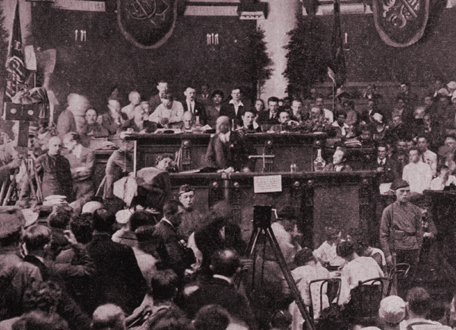Lenin
Leninism: It’s not what you think

By Paul Kellogg
[This article first appeared in Socialist Studies: the Journal of the Society for Socialist Studies 5(2), Fall 2009. It has been posted at Links International Journal of Socialist Renewal with the author's permission.]
Paul Le Blanc: Theories of Stalinism

The Marxism of Leon Trotsky

[Klik di sini untuk artikel-artikel Links dalam Bahasa Indonesia]
oleh Trent Brown
[Pernah dimuat di http://links.org.au/node/1260, dan diterjemahkan ke dalam bahasa Indonesia oleh Data Brainanta, Staff Dept. Kaderisasi dan Komunikasi Massa DPP Papernas.]

By Graham Milner

Graphic from http://www.i
Versailles vs Comintern: two visions of world peace

By Barry Healy
June 28, 2009, was the anniversary of the two bookends of World War I, in which it is estimated more than 15 million people died. On that date in 1914 Austrian Archduke Franz Ferdinand was assassinated in Sarajevo and, five years later, in 1919, 90 years ago this year, the Versailles Treaty was signed in Paris.
The first war in which the capacity of modern industry to deploy, feed, arm and dismember people was so hideously demonstrated, WWI was experienced by its victims as the "war to end all wars". Unfortunately, it proved not to be.
Out of the ashes of the conflict two competing visions of world peace arose: Versailles and the revolutionary and democratic alternative represented by the Communist International (Comintern) emanating from the 1917 Russian Revolution.
US President Woodrow Wilson swept into the treaty negotiations declaring: “The world must be made safe for democracy.” Over six months of intense horsetrading at Versailles a new imperialist order was hammered out, resulting in many of the conflicts that followed.
Free pamphlet: Revolutionaries and parliament: The Bolshevik experience
By Maurice Sibelle

By Chris Slee
Proceedings of Fourth Congress of the Communist International to be published
In October, John Riddell, co-editor of Socialist Voice, completed a draft translation of the proceedings of the Fourth Congress of the Communist International. This ambitious effort (more than 500,000 words) will make all of the resolutions, speeches, and debates from that important 1922 meeting, together with full explanatory annotation, available in English for the first time. The work, which Riddell is preparing in collaboration with the London-based journal Historical Materialism, is planned for publication in 2010.
The British newspaper Socialist Worker interviewed John Riddell (below) about this project for its November 22, 2008, issue.
* * *
By Ken Olende
In 1922 socialists from around the world travelled to Russia to discuss and debate the future of the workers’ movement.
